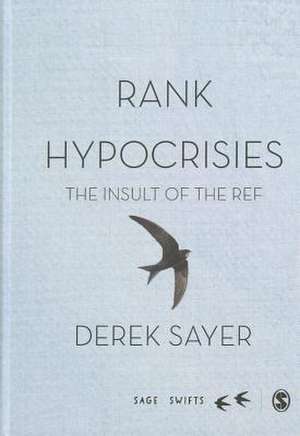Rank Hypocrisies: The Insult of the REF: SAGE Swifts
Autor Derek Sayeren Limba Engleză Hardback – 18 ian 2015
- Tarak Barkawi, London School of Economics
"Sayer makes a compelling argument that the Research Excellence Framework is not only expensive and divisive, but is also deeply flawed as an evaluation exercise. Rank Hypocrisies is a rigorous and scholarly evaluation of the REF, yet written in a lively and engaging style that makes it highly readable."
- Dorothy Bishop, University of Oxford
Few decisions are as consequential for the funding and reputation of Britain's universities as those of REF panels. Not only do REF rankings determine the levels of research funding universities receive from the state. They equally affect institutions' ability to attract external grants, top-flight faculty, and graduate students.
Whatever benefit the UK's periodic research assessment exercises may have brought to research productivity, the REF has been widely criticized for its enormous costs in taxpayers' money and academics' time, its discouragement of innovative (and especially interdisciplinary) research, and its negative effects on collegiality and staff morale.
Derek Sayer extends these arguments, notably through his discussion of the questionable staff selection processes used in REF2014 within his own university. Where Rank Hypocrisies goes beyond previous critiques is in its open challenge to the REF's claim to provide 'expert review of the outputs' - the very heart of its legitimacy.
Examining the composition and operation of REF disciplinary subpanels in forensic detail, Sayer paints a picture in which overburdened assessors assign vaguely defined grades in fields that are frequently not their own while ignoring all external indicators of the academic influence of the publications they are appraising, and then shred all records of their deliberations.
Judged against international norms of peer review, the REF is an elaborate charade - and an insult to the core values of the academy.
Din seria SAGE Swifts
-
 Preț: 425.64 lei
Preț: 425.64 lei -
 Preț: 426.41 lei
Preț: 426.41 lei -
 Preț: 425.75 lei
Preț: 425.75 lei -
 Preț: 426.09 lei
Preț: 426.09 lei -
 Preț: 426.57 lei
Preț: 426.57 lei - 22%
 Preț: 358.89 lei
Preț: 358.89 lei -
 Preț: 246.37 lei
Preț: 246.37 lei -
 Preț: 246.65 lei
Preț: 246.65 lei -
 Preț: 408.59 lei
Preț: 408.59 lei -
 Preț: 425.37 lei
Preț: 425.37 lei -
 Preț: 426.51 lei
Preț: 426.51 lei -
 Preț: 485.13 lei
Preț: 485.13 lei - 15%
 Preț: 512.67 lei
Preț: 512.67 lei - 15%
 Preț: 511.83 lei
Preț: 511.83 lei - 5%
 Preț: 472.05 lei
Preț: 472.05 lei - 15%
 Preț: 466.52 lei
Preț: 466.52 lei - 22%
 Preț: 372.16 lei
Preț: 372.16 lei -
 Preț: 468.37 lei
Preț: 468.37 lei - 22%
 Preț: 358.68 lei
Preț: 358.68 lei - 22%
 Preț: 358.25 lei
Preț: 358.25 lei - 15%
 Preț: 422.36 lei
Preț: 422.36 lei -
 Preț: 481.49 lei
Preț: 481.49 lei - 22%
 Preț: 371.74 lei
Preț: 371.74 lei - 15%
 Preț: 466.03 lei
Preț: 466.03 lei - 15%
 Preț: 448.92 lei
Preț: 448.92 lei - 18%
 Preț: 685.93 lei
Preț: 685.93 lei -
 Preț: 115.47 lei
Preț: 115.47 lei -
 Preț: 123.24 lei
Preț: 123.24 lei - 22%
 Preț: 358.25 lei
Preț: 358.25 lei
Preț: 511.01 lei
Preț vechi: 601.19 lei
-15% Nou
Puncte Express: 767
Preț estimativ în valută:
97.78€ • 102.37$ • 80.91£
97.78€ • 102.37$ • 80.91£
Carte tipărită la comandă
Livrare economică 07-21 aprilie
Preluare comenzi: 021 569.72.76
Specificații
ISBN-13: 9781473906563
ISBN-10: 1473906563
Pagini: 128
Dimensiuni: 148 x 210 x 10 mm
Greutate: 0.27 kg
Ediția:1
Editura: SAGE Publications
Colecția Sage Publications Ltd
Seria SAGE Swifts
Locul publicării:London, United Kingdom
ISBN-10: 1473906563
Pagini: 128
Dimensiuni: 148 x 210 x 10 mm
Greutate: 0.27 kg
Ediția:1
Editura: SAGE Publications
Colecția Sage Publications Ltd
Seria SAGE Swifts
Locul publicării:London, United Kingdom
Recenzii
Written with great clarity and obvious intense anger… Rank Hypocrisies is not the last word on the 2014 REF, but it is a partial, powerful, well-researched polemic uncovering the poverty of academic decision-making at the heart of such flawed exercises. No hostages are taken, no named individuals spared criticism where it is considered due – all undertaken in defence of academic standards, academic freedom and the rights of individuals that their employers exercise a duty of care.
Derek Sayer's book is essential reading for all university researchers and research policy makers. It discusses the waste, biases and pointlessness of Britain's Research Excellence Framework (REF), and its misuse by universities. The book is highly readable, astute, sharply analytical and very intelligent. It paints a devastating portrait of a scheme that is useless for advancing research and that does no better job at ranking research performance than do the global indexes but does so for a huge cost in time, money, duplication, and irritation. Anyone interested in research ranking, assessment, and the contemporary condition of the universities should read this book.
Sayer makes a compelling argument that the Research Excellence Framework is not only expensive and divisive, but is also deeply flawed as an evaluation exercise. Rank Hypocrisies is a rigorous and scholarly evaluation of the REF, yet written in a lively and engaging style that makes it highly readable.
Many academics across the world have come to see the REF – and its RAE predecessor – as an arrogant attempt to raise national research standards that has resulted in a variety of self-inflicted wounds to UK higher education. Derek Sayer is the Thucydides of this situation. A former head of the Lancaster history department, he fell on his sword trying to deal with a university that behaved in an increasingly irrational manner as it tried to game a system that is fundamentally corrupt in both its conception and execution. Rank Hypocrisies is more than a cri de coeur. It is the best documented diagnosis of a regime that has distorted the idea of peer review beyond recognition. Only someone with the clear normative focus of a former insider could have written this work. Thucydides would be proud.
The REF is right out of Havel’s and Kundera’s Eastern Europe: a state-administered exercise to rank academic research like hotel chains - 2 star, 3 star - dependent on the active collaboration of the UK professoriate. In crystalline text steeped in cold rage, Sayer takes aim at the REF’s central claim, that it is a legitimate process of expert peer review. He provides a short history of the RAE/REF. He critiques university and national-level REF processes against actual practices of scholarly review as found in academic journals, university presses, and North American tenure procedures. His analysis is damning. If the REF fails as scholarly review, how can academics and universities continue to participate? And how can government use its rankings as a basis for public policy?
Rank Hypocrisies offers a compellingly convincing critique of the research auditing exercise to which university institutions have become subject. Derek Sayer lays bare the contradictions involved in the REF and provides a forensic analysis of the problems and inconsistencies inherent in the exercise as it is currently constituted. A must read for all university academic staff and the fast multiplying cadre of higher education managers and, in particular, government ministers and civil servants in the Department of Business Innovation and Skills.
This important book should be read, and reflected on, by academics, academic managers, university managers, HEFCE, and those parts of Government that are responsible for creating the ‘rough beast’ (Yeats, 1994[1921]) that the research assessment exercise (RAE) has become.
Derek Sayer's book is essential reading for all university researchers and research policy makers. It discusses the waste, biases and pointlessness of Britain's Research Excellence Framework (REF), and its misuse by universities. The book is highly readable, astute, sharply analytical and very intelligent. It paints a devastating portrait of a scheme that is useless for advancing research and that does no better job at ranking research performance than do the global indexes but does so for a huge cost in time, money, duplication, and irritation. Anyone interested in research ranking, assessment, and the contemporary condition of the universities should read this book.
Sayer makes a compelling argument that the Research Excellence Framework is not only expensive and divisive, but is also deeply flawed as an evaluation exercise. Rank Hypocrisies is a rigorous and scholarly evaluation of the REF, yet written in a lively and engaging style that makes it highly readable.
Many academics across the world have come to see the REF – and its RAE predecessor – as an arrogant attempt to raise national research standards that has resulted in a variety of self-inflicted wounds to UK higher education. Derek Sayer is the Thucydides of this situation. A former head of the Lancaster history department, he fell on his sword trying to deal with a university that behaved in an increasingly irrational manner as it tried to game a system that is fundamentally corrupt in both its conception and execution. Rank Hypocrisies is more than a cri de coeur. It is the best documented diagnosis of a regime that has distorted the idea of peer review beyond recognition. Only someone with the clear normative focus of a former insider could have written this work. Thucydides would be proud.
The REF is right out of Havel’s and Kundera’s Eastern Europe: a state-administered exercise to rank academic research like hotel chains - 2 star, 3 star - dependent on the active collaboration of the UK professoriate. In crystalline text steeped in cold rage, Sayer takes aim at the REF’s central claim, that it is a legitimate process of expert peer review. He provides a short history of the RAE/REF. He critiques university and national-level REF processes against actual practices of scholarly review as found in academic journals, university presses, and North American tenure procedures. His analysis is damning. If the REF fails as scholarly review, how can academics and universities continue to participate? And how can government use its rankings as a basis for public policy?
Rank Hypocrisies offers a compellingly convincing critique of the research auditing exercise to which university institutions have become subject. Derek Sayer lays bare the contradictions involved in the REF and provides a forensic analysis of the problems and inconsistencies inherent in the exercise as it is currently constituted. A must read for all university academic staff and the fast multiplying cadre of higher education managers and, in particular, government ministers and civil servants in the Department of Business Innovation and Skills.
This important book should be read, and reflected on, by academics, academic managers, university managers, HEFCE, and those parts of Government that are responsible for creating the ‘rough beast’ (Yeats, 1994[1921]) that the research assessment exercise (RAE) has become.
Cuprins
Introduction
Benchmarks
Potemkin's Village
Down and Dirty
The Abject Academy
Benchmarks
Potemkin's Village
Down and Dirty
The Abject Academy
Notă biografică
Descriere
A book that all HE academics and administrators will want to read. Derek Sayer has been involved in a well-publicized dispute with his employer, Lancaster University, about what he sees as irregularities in the REF process. In this scathing account, he not only criticizes the REF for discouraging innovation and harming staff morale, but also questions the REF's claim to provide 'expert review of the outputs' - the very heart of its legitimacy.














